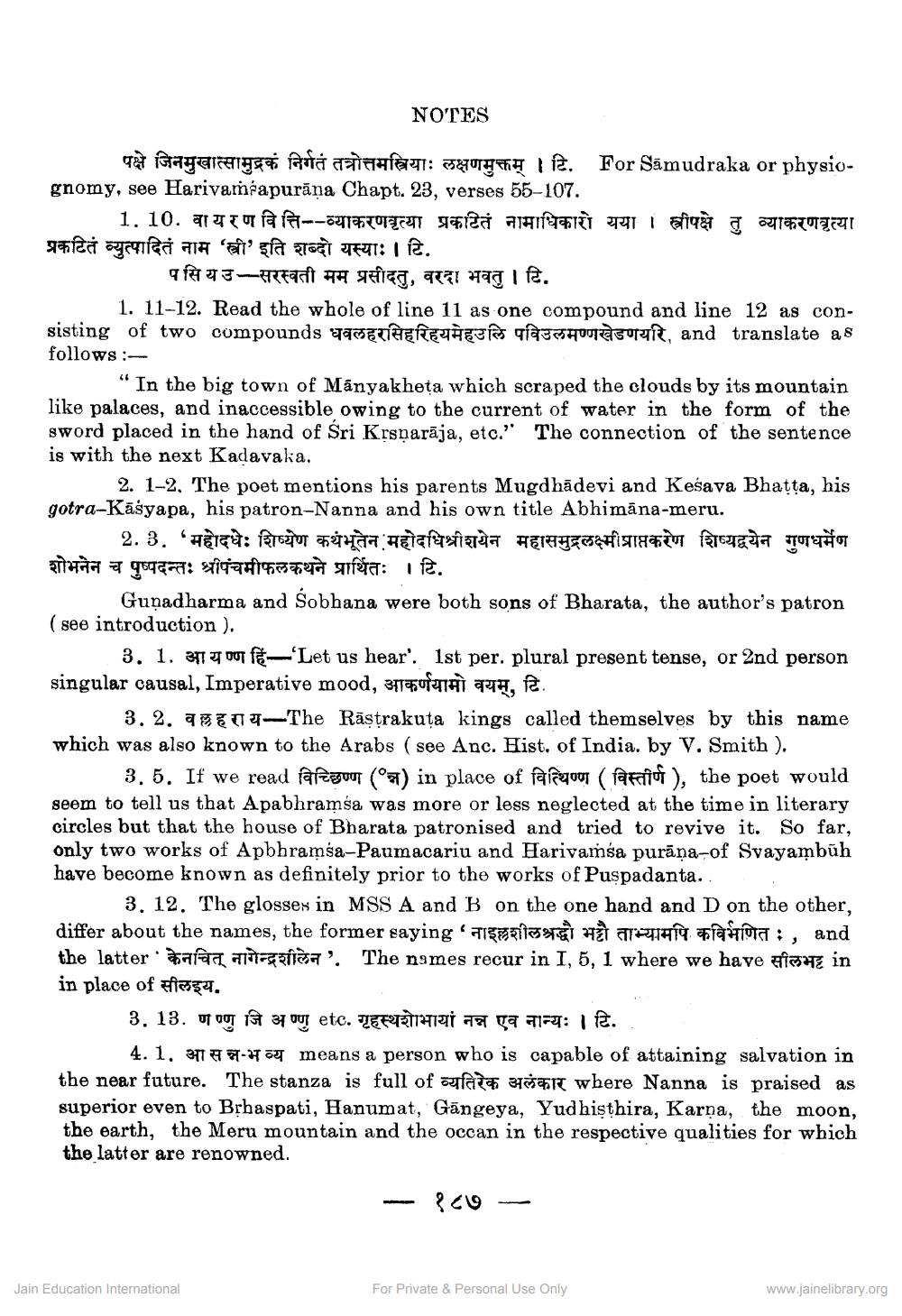________________
NOTES et againya asta azinufatti: TUTTI I Ê. For Sãmudraka or physiognomy, see Harivamiapurāna Chapt. 23, verses 55-107.
1. 10. वायरण वित्ति--व्याकरणवृत्या प्रकटितं नामाधिकारी यया । स्त्रीपक्षे तु व्याकरणवृत्या प्रकटितं व्युत्पादितं नाम 'स्त्री' इति शब्दो यस्याः । टि.
पसि य उ-सरस्वती मम प्रसीदतु, वरदा भवतु । टि.
1. 11-12. Read the whole of line 11 as one compound and line 12 as consisting of two compounds धवलहरसिहरियमेहउलि पविउलमण्णखेडणयरि, and translate as follows:
"In the big town of Mânyakheta which scraped the clouds by its mountain like palaces, and inaccessible owing to the current of water in the form of the sword placed in the hand of Sri Krsnarāja, etc." The connection of the sentence is with the next Kadavaka.
2. 1-2. The poet mentions his parents Mugdhādevi and Kesava Bhatta, his gotra-Kāšyapa, his patron-Nanna and his own title Abhimāna-meru.
2. 3. 'महोदधेः शिष्यण कथंभूतेन महोदधिश्रीशयेन महासमुद्रलक्ष्मीप्राप्तकरण शिष्यद्वयेन गुणधर्मेण शोभनेन च पुष्पदन्तः श्रीपंचमीफलकथने प्रार्थितः । टि.
Gunadharma and Sobhana were both sons of Bharata, the author's patron (see introduction).
3. 1. 371 J Outf-'Let us hear'. 1st per. plural present tense, or 2nd person singular causal, Imperative mood, 377FAT 277, sê.
3. 2. 978 -The Rāstrakuta kings called themselves by this name which was also known to the Arabs (see Anc. Hist. of India. by V. Smith ).
3.5. If we read fai aguur (°) in place of fairgout (fafirid), the poet would seem to tell us that Apabhramsa was more or less neglected at the time in literary circles but that the house of Bharata patronised and tried to revive it. So far, only two works of Apbhramsa-Paumacariu and Harivamsa purāna-of Svayambūh have become known as definitely prior to the works of Puspadanta..
3. 12. The glosses in MSS A and B on the one hand and D on the other, differ about the names, the former saying 'SENISSET HET RETHIT Hita: , and the latter af 711-51Sa'. The names recur in I, 5, 1 where we have it in in place of piogu.
3. 13. Op on # 34 ou etc. TERTETTHIJİ AF ga 41-4: lê..
4. 1. आ सन्न-भव्य means a person who is capable of attaining salvation in the near future. The stanza is full of lata 3100 TT where Nanna is praised as superior even to Brhaspati, Hanumat, Gāngeya, Yudhisthira, Karna, the moon, the earth, the Meru mountain and the occan in the respective qualities for which the latter are renowned.
Jain Education International
For Private & Personal Use Only
www.jainelibrary.org




